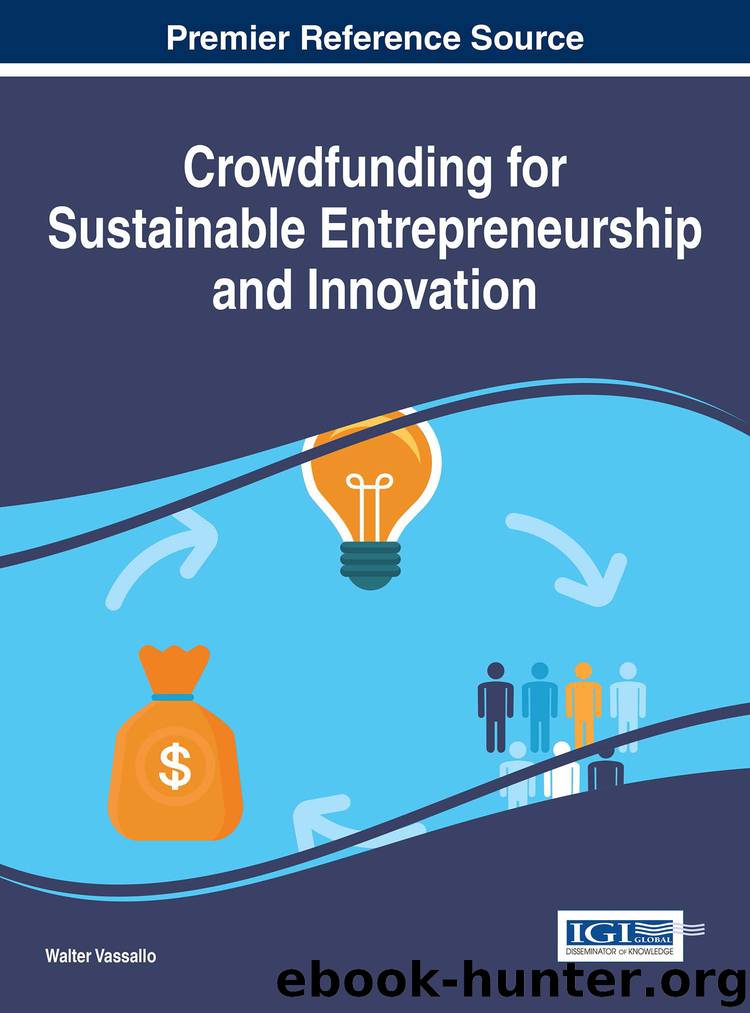Crowdfunding for Sustainable Entrepreneurship and Innovation by Walter Vassallo

Author:Walter Vassallo
Language: eng
Format: epub
Publisher: IGI Global
The design of websites in crowdfunding platforms encourages co-creation of members via allowing project creators to build a profile, add pictures and/or videos and express why they want to collect the money under any of these models. Through these websites with the social networking perspective, project owners willingly share information with intended funders (Kirby & Worner, 2014). Potential funders also actively contribute in crowdfunding websites to provide feedback, comments and recommendations about a new venture. Indeed, crowdfunding communities move ahead of traditional online communities in terms of participation since they allow their members being more proactive by choosing new initiatives to encourage and fund those (Ordanini et al., 2011).
For a sustainable economic system, the actors of the market need a change in spirit that will elevate the life-chances of people for not just being a value initiating contributor, but be an “empowered part” of the economic system. A participative, open knowledge economic and market system that will ensure the material well-being, the social visibility, the happiness and the consciousness of the individual is essential. While a crowdfunding has the characteristics of conventional crowdsourcing and social networking concepts, it has some exclusive features such as members’ incentive and financing roles for supporting of projects. Social and financial motivations are critical to increase interactions among members (Sakamoto & Nakajima, 2013). The crowdfunding system requires collaborative networked communities, those will recast the meanings of both production and innovation as well as will blur the producer and the consumer dichotomy further. Actors use crowdfunding platforms as a co-creation mechanism. Relationships in these virtual settings are supportive rather than competitive. These communities are online and bring high potential as drivers of co-creation, allowing network actors to access to new knowledge, sharing risk and resources, joining complementary skills and capacities. As a result, crowdfunding platforms include the characteristics of online communities in which actors of a community exchange their knowledge, share their experiences, solve their problems, use common language and have a sense of common identity. Crowdfunding platforms have community-based experiences to create “community benefits” for actors (Ordanini et al., 2011).
As an eco-system, collaborative online crowdfunding networks back up innovation, co-create new sources of value, combine the resources and technologies, as well as create synergies (Camarinha-Matos & Afsarmanesh, 2006). In such a framework all institutional and individual actors will be broadly enfolded in a synergistic and efficient market system celebrating innovations. This prospect is not a vague optimism but is a quest of holistic democracy within its limitations, rooted in the relationship of mutual and bounded interdependence that exists among institutional and civic individual actors of the markets.
THE ROLE OF IDENTIFICATION FOR SUSTAINABILITY OF CO-CREATION IN ONLINE CROWDFUNDING COMMUNITIES
Download
This site does not store any files on its server. We only index and link to content provided by other sites. Please contact the content providers to delete copyright contents if any and email us, we'll remove relevant links or contents immediately.
| Private Equity | Valuation |
| Venture Capital |
The Black Swan by Nassim Nicholas Taleb(7106)
Bad Blood by John Carreyrou(6611)
Pioneering Portfolio Management by David F. Swensen(6288)
Millionaire: The Philanderer, Gambler, and Duelist Who Invented Modern Finance by Janet Gleeson(4465)
Skin in the Game by Nassim Nicholas Taleb(4239)
The Money Culture by Michael Lewis(4198)
Bullshit Jobs by David Graeber(4179)
Skin in the Game: Hidden Asymmetries in Daily Life by Nassim Nicholas Taleb(3989)
The Wisdom of Finance by Mihir Desai(3735)
Blockchain Basics by Daniel Drescher(3574)
Liar's Poker by Michael Lewis(3441)
Fooled by Randomness: The Hidden Role of Chance in Life and in the Markets by Nassim Nicholas Taleb(3105)
Hands-On Machine Learning for Algorithmic Trading by Stefan Jansen(3066)
The Intelligent Investor by Benjamin Graham Jason Zweig(3036)
Mastering Bitcoin: Programming the Open Blockchain by Andreas M. Antonopoulos(3035)
The Power of Broke by Daymond John(2975)
Investing For Dummies by Eric Tyson(2948)
You Are What You Risk by Michele Wucker(2760)
Market Wizards by Jack D. Schwager(2696)
